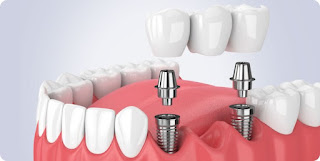Frequently asked questions about Dental Implants
Here are some frequently asked questions about dental implants along with their answers:
1. What are dental implants?
Dental implants are artificial tooth roots made of biocompatible materials, usually titanium, that are surgically placed into the jawbone to support replacement teeth or bridges.
2. How are dental implants placed?
Dental implants are placed through a surgical procedure where a small titanium post is inserted into the jawbone. Over time, the bone fuses with the implant, providing a stable foundation for the replacement tooth.
3. Who is a candidate for dental implants?
Most people with good oral health and sufficient bone density in the jaw are candidates for dental implants. However, a thorough assessment by a dentist or oral surgeon is necessary to determine individual suitability.
4. Are dental implant surgeries painful?
The surgery is usually performed under local anesthesia, so you shouldn't feel any pain during the procedure. Post-surgery discomfort can be managed with pain medication prescribed by the dentist.
5. How long do dental implants last?
With proper care and maintenance, dental implants can last a lifetime. Regular dental check-ups, oral hygiene, and avoiding habits like smoking can contribute to their longevity.
6. What is the recovery period after dental implant surgery?
Recovery times vary, but most people experience some swelling, discomfort, and minor bleeding for a few days after surgery. Complete healing and integration with the jawbone can take several months.
7. Can dental implants replace multiple missing teeth?
Yes, dental implants can support individual crowns or bridges to replace multiple missing teeth. They can also be used to anchor full dentures for improved stability and comfort.
8. Are there any alternatives to dental implants?
Alternatives include traditional dentures and dental bridges. However, dental implants provide better stability, functionality, and long-term benefits compared to these alternatives.
9. Is age a factor for dental implant candidacy?
Age alone is not a determining factor. Good general health and adequate bone density are more important considerations. Older adults can still be candidates for dental implants if they meet the necessary criteria.
10. How do I care for dental implants?
Caring for dental implants is similar to caring for natural teeth. Regular brushing, flossing, and professional dental cleanings are essential. Avoiding smoking and maintaining overall oral health is crucial for the success of implants.
11. What is the success rate of dental implants?
Dental implant success rates are generally high, with reported success rates ranging from 95% to 98%. Factors affecting success include overall health, oral hygiene, and the experience of the dental professional performing the procedure.
12. Can dental implants fail?
Yes, dental implants can fail, although it's relatively rare. Implant failure can be caused by factors like poor oral hygiene, smoking, medical conditions, inadequate bone integration, and improper surgical technique.
13. How much do dental implants cost?
The cost of dental implants varies depending on factors like the number of implants, the need for additional procedures, location, and the expertise of the dental professional. It's best to consult with a dentist for an accurate cost estimate.
Remember, it's important to consult a qualified dentist or oral surgeon for personalized information and guidance regarding dental implants based on your individual circumstances.



Comments
Post a Comment